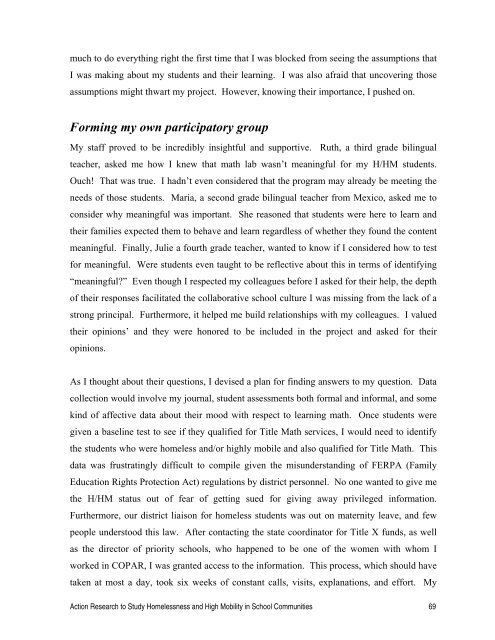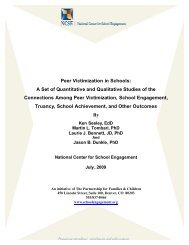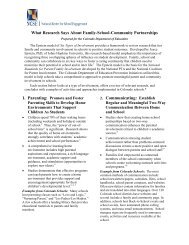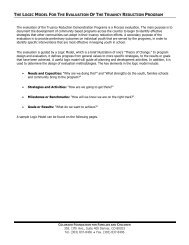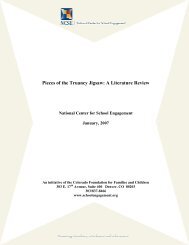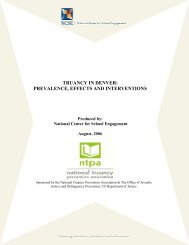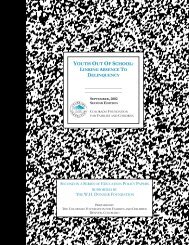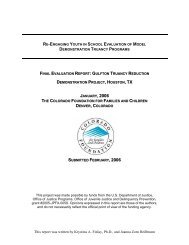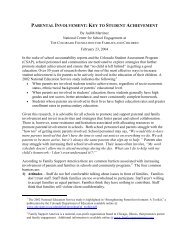Section 1: Academic Achievement - National Center for School ...
Section 1: Academic Achievement - National Center for School ...
Section 1: Academic Achievement - National Center for School ...
You also want an ePaper? Increase the reach of your titles
YUMPU automatically turns print PDFs into web optimized ePapers that Google loves.
much to do everything right the first time that I was blocked from seeing the assumptions that<br />
I was making about my students and their learning. I was also afraid that uncovering those<br />
assumptions might thwart my project. However, knowing their importance, I pushed on.<br />
Forming my own participatory group<br />
My staff proved to be incredibly insightful and supportive. Ruth, a third grade bilingual<br />
teacher, asked me how I knew that math lab wasn’t meaningful <strong>for</strong> my H/HM students.<br />
Ouch! That was true. I hadn’t even considered that the program may already be meeting the<br />
needs of those students. Maria, a second grade bilingual teacher from Mexico, asked me to<br />
consider why meaningful was important. She reasoned that students were here to learn and<br />
their families expected them to behave and learn regardless of whether they found the content<br />
meaningful. Finally, Julie a fourth grade teacher, wanted to know if I considered how to test<br />
<strong>for</strong> meaningful. Were students even taught to be reflective about this in terms of identifying<br />
“meaningful?” Even though I respected my colleagues be<strong>for</strong>e I asked <strong>for</strong> their help, the depth<br />
of their responses facilitated the collaborative school culture I was missing from the lack of a<br />
strong principal. Furthermore, it helped me build relationships with my colleagues. I valued<br />
their opinions’ and they were honored to be included in the project and asked <strong>for</strong> their<br />
opinions.<br />
As I thought about their questions, I devised a plan <strong>for</strong> finding answers to my question. Data<br />
collection would involve my journal, student assessments both <strong>for</strong>mal and in<strong>for</strong>mal, and some<br />
kind of affective data about their mood with respect to learning math. Once students were<br />
given a baseline test to see if they qualified <strong>for</strong> Title Math services, I would need to identify<br />
the students who were homeless and/or highly mobile and also qualified <strong>for</strong> Title Math. This<br />
data was frustratingly difficult to compile given the misunderstanding of FERPA (Family<br />
Education Rights Protection Act) regulations by district personnel. No one wanted to give me<br />
the H/HM status out of fear of getting sued <strong>for</strong> giving away privileged in<strong>for</strong>mation.<br />
Furthermore, our district liaison <strong>for</strong> homeless students was out on maternity leave, and few<br />
people understood this law. After contacting the state coordinator <strong>for</strong> Title X funds, as well<br />
as the director of priority schools, who happened to be one of the women with whom I<br />
worked in COPAR, I was granted access to the in<strong>for</strong>mation. This process, which should have<br />
taken at most a day, took six weeks of constant calls, visits, explanations, and ef<strong>for</strong>t. My<br />
Action Research to Study Homelessness and High Mobility in <strong>School</strong> Communities 69


